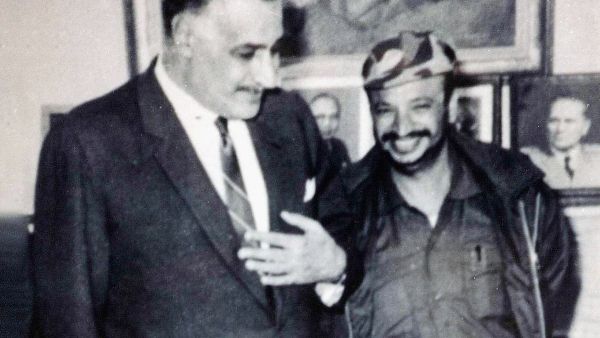Twenty-four hours after Hosni Mubarak's thundering collapse, various Arabic websites ran unconfirmed reports about the former Egyptian president going into a coma and checking into hospital in “critical condition”.
Others ran an equally sensational story about him berating his wife as he prepared to leave Cairo. He reportedly said, “It's all your fault ... you and your son! You ruined my history in Egypt.”
The unconfirmed reports were picked up by very few Egyptian websites. Ordinary Egyptians in Tahrir Square seemed to care very little about what was happening to the man who had ruled them for 30 years.
These young Egyptians — engineers of the January 25 Revolution — were more interested in what was coming next for Egypt. They were no longer looking back, only forward as to what the future had in store for their nation, given that next September they are due to elect a new president.
Hearing these young Egyptians, one can sense — behind the outpouring of joy — a feeling of deep concern. One of the remarkable elements behind this revolution was that it had no single leader — no Lenin, Nasser or Khomeini. Just millions of young Egyptians, mostly aged between 17 and 25, with one clear objective: ousting Mubarak.
That youth vigour was much needed in the opening stages of the uprising because it attracted the world's attention, snowballing in momentum for 18 days as something new in the history of the Arab nation.
Now with Mubarak gone, young Egyptians realise that they need to urgently agree on a leader to represent them, articulating their demands before the caretaker cabinet of Prime Minister Ahmad Shafik, before the Military Command, and before the international community.
Otherwise they run the high risk of having established politicians hijacking the revolution; those older in age who come from a clear, and organised, political platform. That has already started, they complain, citing Mohammad Al Baradei, for example, and low-profile politicians from dead parties, or army generals, who surfaced with remarkable speed after Mubarak's February 11 resignation.
Deciding on a single leader to represent the young Egyptians will be a very difficult task, given that no ideology, social background, or party line unites them. Getting rid of Mubarak was one thing, but agreeing on a youth leader to speak for the millions of young Egyptians will be something totally different.
Undoubtedly there are many examples in the minds of young Egyptians that they will seek to copy or live up to. The very obvious ones are Sa'ad Zaghloul, hero of the Egyptian Revolution of 1919, and Jamal Abdul Nasser.
Zaghloul Pasha is less controversial than Nasser, given that Egyptians from different ends of the political spectrum respect him as one of the founding fathers of Egyptian independence.
He died too long ago, however, back in 1927, and all of these young Egyptians read about him in history books or heard of him from their grandfathers. Meaning, he doesn't really matter when it comes to deciding who will come to power in the post-Mubarak order.
Nasser, however, was a young man like them when he helped topple King Farouk in 1952 at the age of 34. Although still immensely popular with grassroots Egyptians, they were careful not to play his charismatic speeches during their 18-day protest, so as not to be accused of being Nasserist, given that there is a Nasserist party that is still active in Egyptian politics—which is highly politicized, aged, ailing and very un-attractive to young Egyptians.
Additionally, admiring Nasser is one thing and being a Nasserist — which also means socialist and leftist — is a totally different matter. Nasser also brings back haunting memories of a police state, arbitrary arrests, one-party rule, crackdowns on the Brotherhood, and an ill-planned war that led to destruction of the Egyptian Army, loss of the Sinai, and permanent psychological damage to an entire generation of Egyptians — the parents of these young Egyptians at Tahrir Square.
Many in the region, like the Hezbollah and Iran, are trying to project the Egyptian Revolution as a coup against Camp David, linking it to a nostalgic Nasserist era. Wishful thinkers from both camps are hoping for a leader who will “restore Nasser's Egypt” to the Arab world.
Many young Egyptians are frowning upon such an assessment, arguing that the 2011 revolt has absolutely nothing to do with Nasser or Camp David. It wasn't a revolt objecting to Mubarak's alliance with Israel, but one calling for dignity and pride of the day-to-day Egyptian.
It was a revolt against corruption, nepotism, and misuse of public office, traits that can be traced throughout the regimes of Farouk, Nasser, Sadat, and Mubarak. When the Military Command announced that it would abide by all international agreements signed or upheld by the Mubarak regime, including Camp David, it is no surprise that nobody objected on the Egyptian street. Foreign affairs, as far as they were concerned — for now — was not on their agenda.
The third role model, who is equally controversial, is Anwar Al Sadat. Although less popular than Nasser, many in the Egyptian street admire him as a brave leader who righted all of Nasser's wrongs, especially when it came to authoritarianism. Those who loath him, however, are many, given that his name graced the unpopular Camp David Accords of 1978.
The ambitious young Internet-savvy generation of Egypt, however, believes that the new Egypt deserves something better than both Nasser and Sadat. The two men are now history and these young Egyptians were all born after both men left the scene in 1970 and 1981 respectively.
Egypt should not rest on its laurels and get over-influenced by its modern history. Surely with 82 million, someone new can be found to lead Egypt, cherry-picking good traits from former leaders while creating a distinct character of his own, avoiding all the mistakes of both men.
By Sami Moubayed








